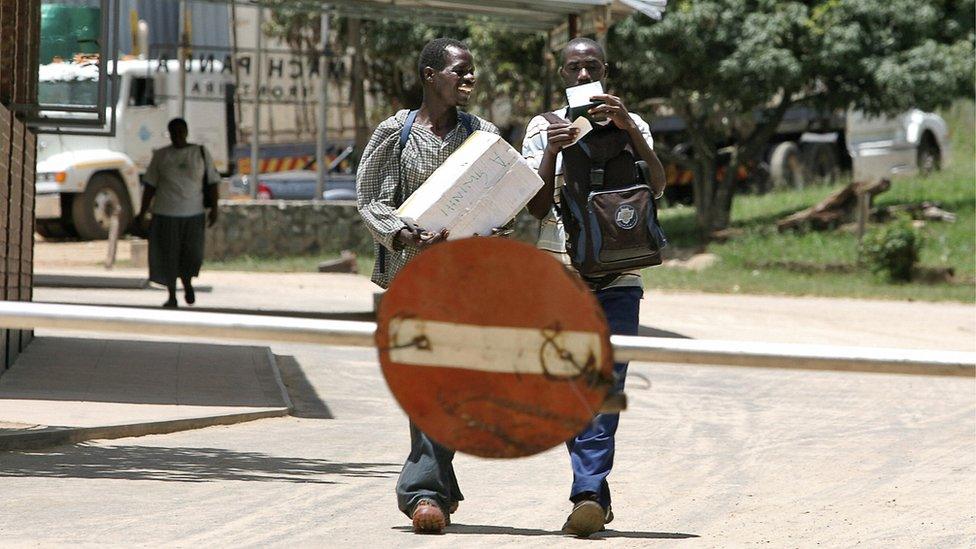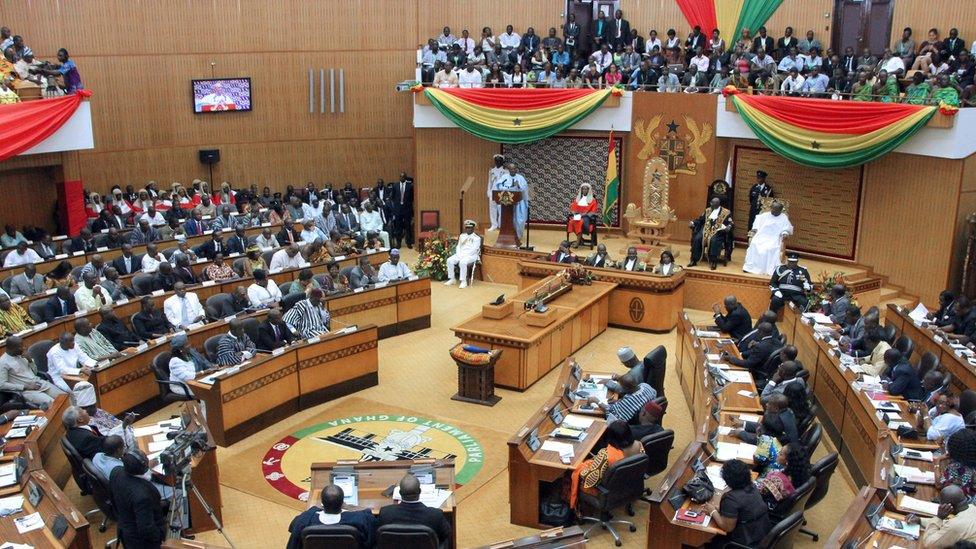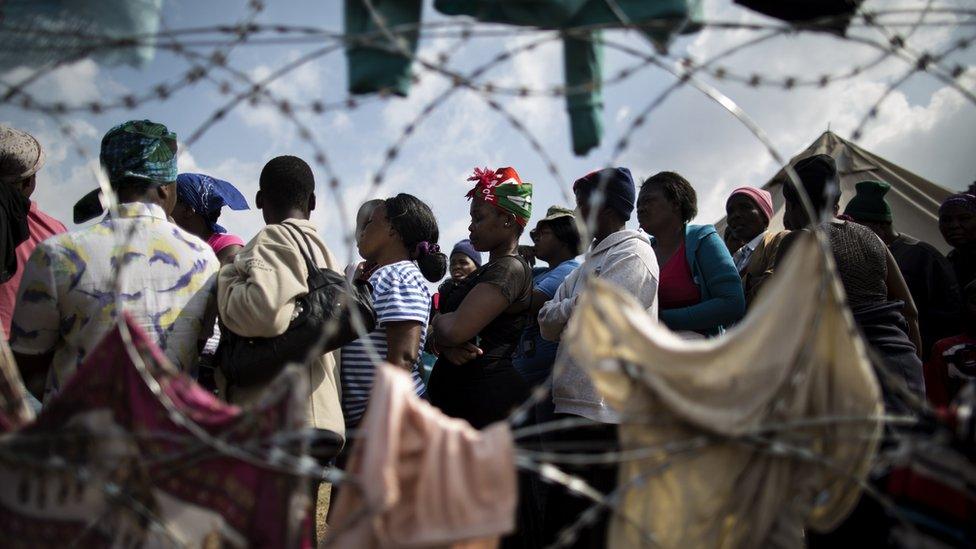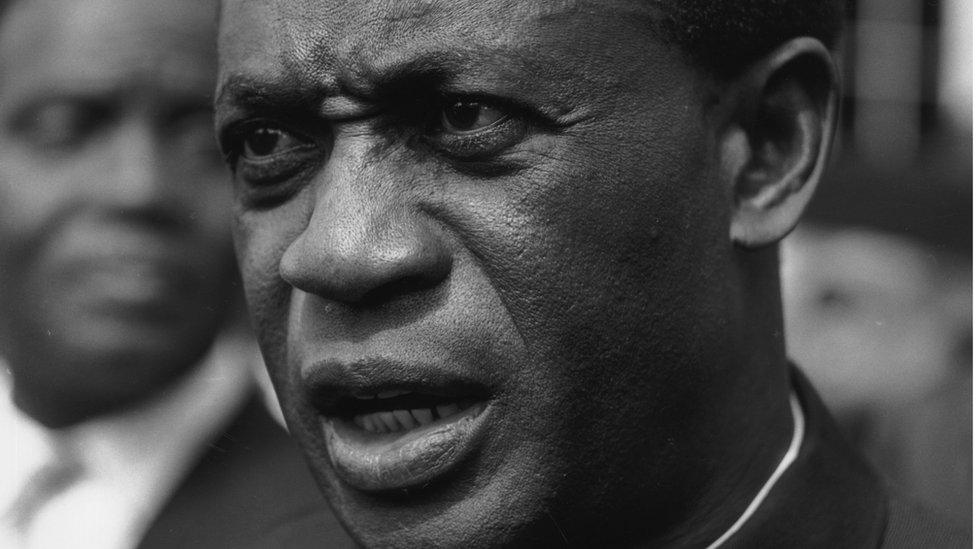Letter from Africa: Ghana opens doors to other Africans
- Published

Zimbabweans crossing the border to Mozambique after visas were no longer required to enter the country in 2007
In our series of letters from African journalists, Ghanaian writer Elizabeth Ohene reflects on Ghana's decision to remove visa requirements for citizens of all African countries.
After President John Dramani Mahama delivered his State of the Nation address two weeks ago, most of the discussions were on local and internal affairs, and this being an election year in the country, the debates were heated and will continue for a long time.
But hidden somewhere in the speech and lost in all the discussion was a major foreign affairs initiative which slipped by without media reporting or analysis and it seems likely people may have missed this completely.

President Mahama slipped the announcement into his State of the Nation address
Ghana's new visa-on-arrival policy for citizens of African Union (AU) member states, to be introduced from July, only came to light after an announcement from the pan-African body.
Nationals from African countries complain loudly about the humiliations they go through to get visas for Europe and the United States but the process for African visas is often just as frustrating.
Anyone who has tried to cross borders on the African continent will have experienced the difficulties with travelling in Africa.
Air fares cost more than anywhere else and few roads or railways connect the countries to each other.
The immigration and police check points turn the journeys into veritable obstacle courses.

South Africa is one country where other Africans do not always receive a warm welcome
We no longer have to go through Europe to fly to each other's countries, but flight connections are so few and so random, you are tempted to resort to the old routes through Europe to go to the country next door.
However, this is nothing compared to the hassle one has to go through to get visas for another African country.
Business people trading in the continent felt frustrated in the past at spending weeks trying to get visas for each country.
They pointed out that once armed with a European Schengen visa, they could travel through many European countries and conduct business without hassle.
Pointless bureaucracies
Unsurprisingly Ecowas, the West African regional body established in 1975 was at the time considered an attractive union due to the introduction of visa-free travel among member states.
Continental organizations like the Organisation of African Unity (OAU), formed to foster cooperation between African states and its successor the African Union (AU), launched in 2002, have few passionate supporters these days in Ghana as they are seen as pointless bureaucracies that have no bearing on the lives of people.
President Mahama's policy could boost AU's significance once again.
African unity was taken very seriously here in Ghana. It was our first President, Kwame Nkrumah, who was the driving force behind the establishment of the OAU back in 1963.

President Kwame Nkrumah was a firm believer in African unity
During the struggle for independence, Ghana provided a place of refuge for many freedom fighters, especially from South Africa with many being given Ghanaian passports.
As countries gained independence, Ghanaians were dismayed to discover they were not particularly welcome in these countries.
In the early years of Ghana's independence, and before the establishment of Ecowas, there were visa exemptions for "persons of African descent" born in the neighbouring west African countries, and members of the Casablanca group, which consisted of Guinea, Tunisia, Mali, United Arab Republic, Morocco and Algeria.
But these arrangements were scrapped after the overthrow of President Nkrumah.
With the new visa policy, Ghanaians will be watching to see if the number of non-Ecowas African nationals coming to Ghana will rise.
We in Ghana have a reputation for restless feet and are always trying to find new destinations to get to.
Obtaining visas for travel is often the greatest obstacle to travel and any country that makes it easier for us to enter becomes very attractive.
Whilst many here will be feeling that Ghana is taking a lead in implementing an AU directive, there will be greater interest in knowing how many other African countries will be allowing Ghanaians to enter their countries on a visa-on arrival policy.

